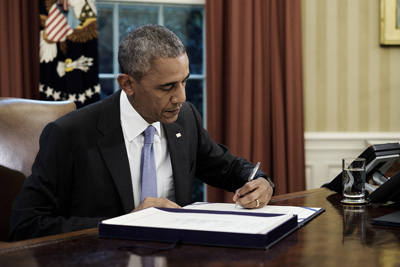So what has President Obama done over the past month to get a few last-minute liberal priorities in place before Donald Trump takes over? Obama has moved forward on eight substantial executive actions so far:
- Enacted a permanent ban on offshore oil and gas drilling in areas of the Arctic and the Atlantic Seaboard.
- Refused to veto a UN resolution condemning Israel’s settlements in the West Bank.
- Designated two new national monuments totalling more than 1.6 million acres: Bears Ears Buttes in southeastern Utah and Gold Butte in Nevada.
 Instructed the Department of Homeland Security to formally end the long-disused NSEERs database, which Trump could have revived as the backbone of a new Muslim registry.
Instructed the Department of Homeland Security to formally end the long-disused NSEERs database, which Trump could have revived as the backbone of a new Muslim registry.- Instructed the Army Corps of Engineers to deny final permits for the Dakota Access Pipeline where it crosses the Missouri River near the Standing Rock Sioux reservation.
- Issued a final rule that bans the practice among some red states of withholding federal family-planning funds from Planned Parenthood and other health clinics that provide abortions.
- Finalized rules to determine whether schools were succeeding or failing under the Every Student Succeeds Act.
- Began an investigation into charges of Russian hacking during the presidential campaign.
This last-minute flurry of activity is actually fairly normal, but Trump is annoyed anyway, saying he’s doing his best to “disregard the many inflammatory President O statements and roadblocks.” Too bad, Donald: there’s more to come. According to Politico, “As many as 98 final regulations under review at the White House as of Nov. 15 could be implemented before Trump takes office. Seventeen regulations awaiting final approval are considered “economically significant,” with an estimated economic impact of at least $100 million a year.” Here are fifteen of the most important ones:
- A new policy making it easier to hire and retain highly skilled immigrants.
- A new rule forcing state regulators to tighten oversight of for-profit colleges that operate online courses in their state.
- New energy efficiency standards.
- Regulations designed to discourage speculation on commodities trading.
- A new rule that would regulate air pollution from the oil industry.
- A change in the way Medicare drug payments are administered.
- Reform of Medicare payments to doctors, moving toward a system that better evaluates the quality of care they provide.
- Finishing up an investment treaty with China (though it would require Senate approval in 2017).
- Speeding through a backlog of debt relief claims from students at ITT Tech and Corinthian Colleges, two for-profit colleges that went out of business under pressure from the Obama administration.
- A ban on cellphone calls on commercial flights.
- A rule requiring that most freight trains have at least two crew members on duty.
- Rules for the 2018 version of the Obamacare state insurance marketplaces.
- Regulation of methane releases from oil and natural gas wells.
- A major rule on leases for wind and solar projects on federal land.
- A rule that aims to ensure poor and minority students get their fair share of state and local education funding.
Some of these actions could be overturned either by Trump or by Congress, but not all of them. Congress is restrained by the fact that it has limited floor time to review new rules. Trump is restrained because agency rules go through a lengthy rulemaking process before they’re finalized, and he would have to start up this entire process all over again to repeal them.
Of course, all of these actions are also susceptible to court fights, just as they always are. There’s no telling how that might turn out.

















